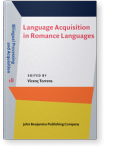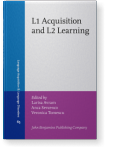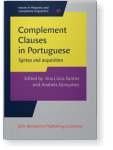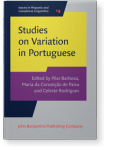Ana Madeira
List of John Benjamins publications for which Ana Madeira plays a role.
2024 Chapter 1. Anaphora resolution in L2 European Portuguese: Animacy effects and the position of the antecedent Language Acquisition in Romance Languages, Torrens, Vicenç (ed.), pp. 12–33 | Chapter
This study investigates the interpretation of subject pronouns in L1 Italian – L2 European Portuguese, considering animacy effects and the position of the antecedent. Participants were 25 adult EP native speakers, 25 upper-intermediate, 25 advanced, and 19 near-native Italian adult learners of… read more
2024 Are non-native speakers sensitive to microvariation in anaphora resolution? The case of Italian and Spanish learners of L2 European Portuguese Linguistic Approaches to Bilingualism: Online-First Articles | Article
This study investigates anaphora resolution in L2 European Portuguese by Italian and Spanish native speakers to examine whether learners are sensitive to microvariation among these null subject Romance languages. Participants were 25 adult L1 EP speakers, 69 L1 Italian, and 42 L1 Spanish adult… read more
2021 Chapter 7. L1 effects in the L2 acquisition of long-distance binding in European Portuguese L1 Acquisition and L2 Learning: The view from Romance, Avram, Larisa, Anca Sevcenco and Veronica Tomescu (eds.), pp. 173–202 | Chapter
This paper examines the acquisition, by Spanish and Italian speakers, of the binding properties of the long-distance reflexive si in European Portuguese in indicative and subjunctive contexts, addressing the following research questions: (i) Do learners transfer knowledge of the binding… read more
2018 Inflected infinitives in L2 Portuguese Complement Clauses in Portuguese: Syntax and acquisition, Santos, Ana Lúcia and Anabela Gonçalves (eds.), pp. 321–360 | Chapter
This study investigates the acquisition of morphosyntactic and interpretative properties of the Portuguese inflected infinitive by Chinese and Spanish speakers, using three experimental tasks. Assuming a Full Access approach (Schwartz & Sprouse, 1996) and the Interface Hypothesis (Sorace, 2011),… read more
2017 Chapter 12. The Portuguese inflected infinitive across varieties Studies on Variation in Portuguese, Barbosa, Pilar, Maria da Conceição de Paiva and Celeste Rodrigues (eds.), pp. 279–300 | Chapter
The aim of this paper is to investigate the properties and distribution of the inflected infinitive in different varieties of Portuguese, both from a diachronic and a synchronic perspective. Considering the development of the inflected infinitive from the 12th century up to the present, we argue… read more



